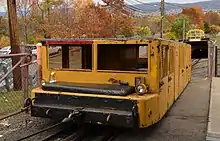Lackawanna Coal Mine
The Lackawanna Coal Mine is a museum and retired coal mine that is located in McDade Park in Scranton, Pennsylvania. It opened in 1903.[1]
 | |
| Established | 1985 |
|---|---|
| Location | Bald Mountain Rd, McDade Park, Scranton, Pennsylvania |
| Coordinates | 41°25′00″N 75°42′55″W |
| Type | Mining, industrial history |
| Website | Lackawanna Coal Mine |

History
Lackawanna County, including Scranton, is part of the Northern Field of the coal region of Pennsylvania and many Europeans immigrated to the area to work in the mines.[2][3]
In 1903, the Continental Coal Company opened the Lackawanna Coal Mine.[1]
After operating for more than half a century, this mine was closed in 1966 and lay abandoned until 1978. That year, the mine was converted to a museum, supported by $2.5 million in federal money. Restoration included the removal of debris, the laying track to enable a mine car to carry visitors into the mine, the installation of electricity for lights, and the reinforcement of the mine's shafts with steel buttresses improve safety[4] prior to the museum's official opening, which occurred in 1985.[5][4]
In 1987, Lackawanna County received a $300,000 state grant to build a 2,500-square-foot (230 m2) museum building to house exhibits and artifacts. The addition is called the Shifting Shanty, a name used to describe the area where miners showered after a shift.[6]
Adjacent to the mine tour is the Pennsylvania Anthracite Heritage Museum with exhibits on Northeastern Pennsylvania's mining and industrial history. The museum is run by Lackawanna County.[4]
Museum tour
The purpose of the mine is to give visitors a feeling for what it was like to work in an underground mine.[5] The tours are led by former miners, or children of miners.[5]
Visitors board a mine car and descend the #190 slope, about 250 ft (76 m) below ground, into the Clark Vein of coal. The tour proceeds, on foot, through several twisting veins of the abandoned mine.[5]

During the tour, the tour guides describe various aspects of the anthracite mining industry in Pennsylvania including the file of the fire boss, air doors and their role in ventilation, door boys or nippers, second means of exit from the mine, and the company store.[7] The temperatures within the mine are around a constant of 50–54 °F (10–12 °C).
In popular culture
The Lackawanna Coal Mine is featured in seasons 3 and 4 of the television adaptation of The Man in the High Castle where is it is depicted as having an artificial portal to parallel worlds.[8]
In season 1 of The Office Michael Scott is seen attempting to organize a field trip for his office to the museum under the assumption that the elevator that takes visitors down into the mine is a ride analogous to a roller-coaster drop instead of the slow and prolonged descent into an industrial coal mining facility that it actually was.
References
- Beniquez, Lorena (7 August 2017). Lost Coal Country of Northeastern Pennsylvania. Arcadia Publishing Incorporated. pp. 47–52. ISBN 978-1-4396-6183-3.
- "Scranton, Pennsylvania". www.mininghistoryassociation.org. Retrieved October 7, 2018.
- "Coal industry". Immigration to the United States. Retrieved October 7, 2018.
- Janoski, Dave (October 22, 1995). "West Pittson's Tom Supey keeps mining legacy alive - Newspapers.com". Sunday Dispatch. Pittston, Pennsylvania. p. 3. Retrieved October 7, 2018 – via Newspapers.com.
- "A down and dirty job: The men who lead tunnel tours - Newspapers.com". The Times Leader. Wilkes-Barre, Pennsylvania. August 14, 1988. p. 29. Retrieved October 7, 2018 – via Newspapers.com.
- "Lackawanna Coal Mine ready for $300,000 exhibit expansion - Newspapers.com". Times Leader. Wilkes-Barre, Pennsylvania. September 27, 1987. p. 25. Retrieved October 7, 2018 – via Newspapers.com.
- "Coal Mine « Lackawanna County". www.lackawannacounty.org. Retrieved October 7, 2018.
- Tallerico, Brian (October 7, 2018). "The Man in the High Castle Recap: The Different Truth". Vulture. Retrieved October 15, 2018.